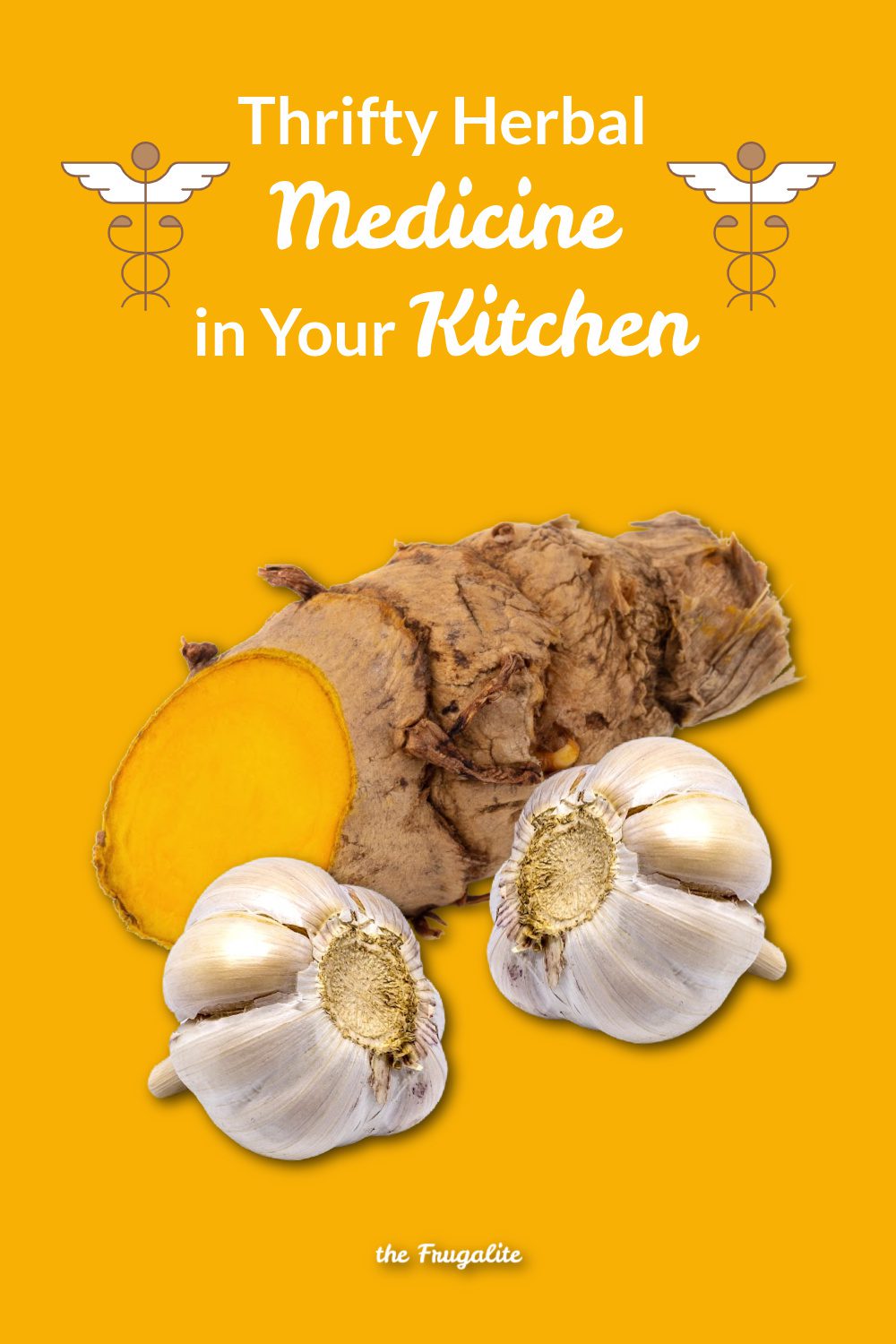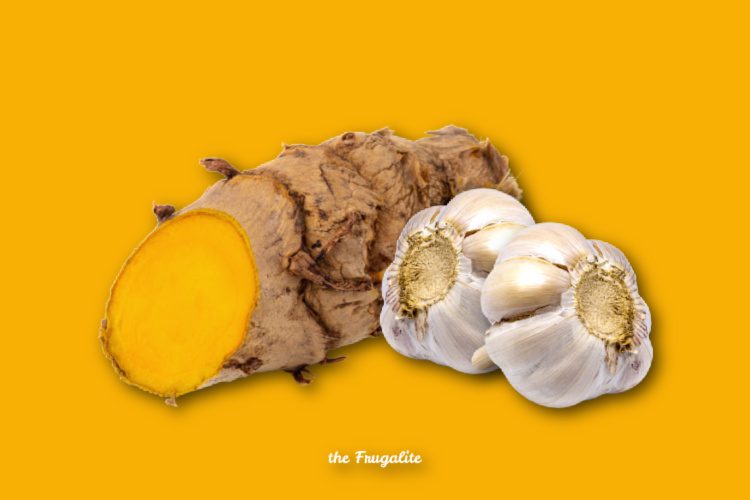(Psst: The FTC wants me to remind you that this website contains affiliate links. That means if you make a purchase from a link you click on, I might receive a small commission. This does not increase the price you’ll pay for that item nor does it decrease the awesomeness of the item. ~ Daisy)
No one likes to get sick, but what you might not realize is you may already have some thrifty herbal medicine in your kitchen! I am going to share information about two inexpensive anti-viral herbs. These are remedies I have been using myself. You might have heard these herbs have anti-viral properties, but you might have wondered how to use them yourself. Or you might be a fan of these two herbs already. Perhaps you might learn a new use for one of your favorites.
It seems to me I was always interested in herbal medicines
However, I began my journey into herbal medicine more formally some 25 years ago when a friend gave me “Heinerman’s Encyclopedia of Healing Herbs and Spices”
I was fascinated by the work of Heinerman, a medical anthropologist who has traveled to over 30 countries to collect information about countless herbs and how they are used to heal. In the style of Heinerman, who shared stories collected from people about how they used herbs and spices for healing, I will share personal stories about two of my thrifty herbal favorites with you.
DISCLAIMER: This article states the opinions and experiences of the author and does not constitute medical advice. The FDA has not tested these claims. Due to the risk of allergic reactions and interactions between herbal medicines and prescription medicines, always consult with your own physician before taking any herbal medicines.
Garlic
Garlic contains “powerful compounds that fight viruses, including influenza, rhinovirus, cytomegalovirus (a type of herpes virus), herpes simplex, HIV, viral pneumonia, and rotavirus” [source]
When I feel something coming on, I will sometimes eat a raw clove or two. I like to chop the cloves up first and then swallow them with a water chaser. Yes, I might smell like garlic the next day, but if I have beaten my viruses, do I care? Noooooo!
If I do begin to feel ill, I make garlic “tea.” I thinly slice two good-sized cloves of garlic, put them in a coffee mug, and then add boiling water. I like to steep this for around five minutes. As it steeps, I like to inhale the garlic steam deeply. Sometimes, I’ll even put a small towel over my head to improve the concentration of the steam. This is especially helpful if you are stuffed up. I sip this tea while it is warm. Then, you can add more hot water and brew again. After that, I usually eat the sliced garlic cloves and begin again!
Turmeric
Turmeric is a powder made from the root of the Turmeric plant, a member of the ginger family [source]. Its bright yellow color might be familiar to you, as it is a part of curry powder. (Yes, that yellow part that stains everything!) Curcumin, the anti-viral compound in turmeric, has been found in studies to be active against a wide range of viruses, including HIV, herpes, dengue, zika, and chikungunya. [source]
I take a teaspoon of high-quality, organic turmeric every day in my homemade kefir cultured milk. Because there have been some issues in the past with the quality of turmeric and contamination, I am careful to buy only organic turmeric from a reputable company. This daily dose of turmeric is mainly part of my preventative health program. I am in my fifties and work very hard labor on a farm these days and I feel great! I believe the turmeric is helping keep my joints working well and pain-free. As well, I feel the turmeric is an excellent preventative against any viruses I might meet.
However, I also turn to turmeric in times of acute illness
For example, I was getting run down, burning my candle at both ends, not too long ago. A sure sign of this is when I start to get a cold sore: UGH! It was just beginning, not even showing on my lip, but it had already begun that tell-tale “tingling.” Immediately, I turned to an old remedy I had learned in Heinerman’s Encyclopedia: I put a paste of turmeric and lime juice on the affected area of my lip and let it stay there as long as possible. The paste must be thick enough to stick on there, not too runny. I got the hang of it after a couple of tries. To help stop it from dropping off, I covered it with a small piece of tissue paper. Paper towels might also work well. OK, this might not sound terribly attractive, but bear with me!
The results were nothing short of remarkable
I applied the turmeric poultice a few times for several hours at a time and tried my best to keep it on overnight with some success. The cold sore never progressed and disappeared entirely after just a few days. I was absolutely amazed!
Many years ago, I had a serious knee injury from sports. My physiotherapist commented that I seemed to have a great deal of inflammation in that left knee that kept it stiff and painful. Wondering if there was something I could do with herbs to help, I consulted my Heinerman’s Encyclopedia. I learned that turmeric is very good for tendon injuries. So, I applied a similar poultice of turmeric and lime juice to my affected knee, wrapped it in saran wrap, and then applied heat. Yes, my knee was yellow, and I was teased a bit at physio because of that. However, I felt that it helped my inflammation and healing.
Here are some ways to support your immune system as well to help fend off illness. And, let’s not forget the health benefits of managing stress.
Another awesome book you may want to check out is Prepper’s Natural Medicine.
Food? Medicine?….Or Both?
Do you head for the kitchen or your bathroom cabinet when you feel something coming on? Could you see yourself trying garlic or turmeric in the ways described here? Do you have your own way you like to take garlic or turmeric you can share with us? Please tell us in the comments below.












10 thoughts on “Thrifty Herbal Medicine in Your Kitchen”
I like steep garlic cloves in honey in a Kilner jar with a touch of apple cider vinegar and take a spoonful each morning in the winter. It seems to ward off colds and flu for me ?
Hi Magdalena, I had to look up what a Kilner jar is. Turns out I own some! Your recipe sounds great and like your own version of fire cider. We had a great recipe for this shared by a reader on my related post about Immune Boosters. Thanks for sharing, especially as this has been so successful for you!
Raw honey, fresh lemon, garlic and cinnamon stick. My go-to for all maladies respiratory! I throw in ginger if I have it on hand. Keep it in the fridge. Helps with allergies as well if you use local honey.
Hi Grammyprepper, I am loving these honey-based recipes! I clearly need to try this. Do you put this in a cup of tea, or take it like Magdalena does, and take a spoonful daily. I am excited to try this. Very good tip to use local honey for allergies. I believe this does help me, too. Thanks so much!
We just take a tablespoon as needed. But you could certainly take it in a hot cup of tea. That warmth would be especially soothing for a sore scratchy throat. And the steam would help unclog the sinuses!
Very Good, Grammyprepper! That is helpful to know how you use it, as it sounds like it has been working well. I will be making some of my own this fall and can update the group with any insights I gain from trying it in tea. Thanks so much!
Love it! I use the garlic the same way. Or I’ll eat it raw. Or I’ll put it in chicken soup. Here’s a couple other pantry remedies that I’ve used extensively:
Ginger – whether ginger tea, in food, raw, or pickled. Helps upset stomachs a lot. A pregnant girl I knew who had bad morning sickness told me the ginger candy I was giving her worked better than her prescription.
Peppermint (spearmint too works but not as well) for breathing. A nice hot steaming cup of peppermint tea is great, and it helps open the passageways both through inhaling the vapor and by drinking the tea. It’s been shown that the peppermint itself has bronchiodilating properties. I use it when I have a mild asthma attack or a bad cough.
If I have a really bad cough I mix a few drops of peppermint essential oil with vodka and sometimes sugar or honey. Shaken well, I take it in tiny sips and it works better than cough medicine.
Hi Redbranch, Wow! You’ve got a great natural medicine pantry on hand. I was not aware of the benefits of peppermint and will be trying peppermint tea for my mild asthma by inhaling it. A great tip. I always have vodka on hand for making herbal tinctures, so am interested in trying this remedy for coughs if I get one. Love your tips for ginger. I hope to write a follow up and include ginger (just ran out of space on this one!), so will include your tips there. Many thanks!!!
Eucalyptus leaves in a hot bath, and drinking eucalyptus tea, for colds, coughs, and congestion.
Hi Mitch, Yes!!! Eucalyptus is wonderful. I always have the essential oil on hand. When I take a hot bath, I put a couple drops in the bath and also just wipe a couple of drops onto the edge of the bathtub to increase the scent in the air. I was not aware you could drink this as tea, so will keep my eye out. Much appreciated to have your tips for all readers. Thank you!